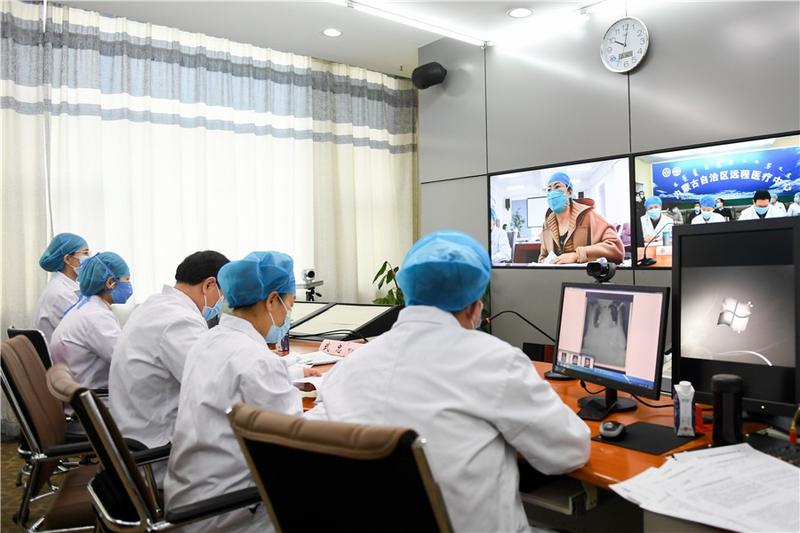 Medical experts hold online consultations at the Telemedicine Center of the Inner Mongolia Autonomous Region in Hohhot on Feb 14. (PHOTO / XINHUA)
Medical experts hold online consultations at the Telemedicine Center of the Inner Mongolia Autonomous Region in Hohhot on Feb 14. (PHOTO / XINHUA)
China's internet-based healthcare is playing an increasingly integral part in the fight against the novel coronavirus epidemic.
Given the fact that most people are staying at home and avoid going to physical hospitals, the user volume in China's internet healthcare sector is estimated to surpass 60 million in 2020
Favorable policies have allowed the sector to boost the medium-to long-term development of the medical industry and contributed to the country's stable economic development, industry experts said.
Given the fact that most people are staying at home and avoid going to physical hospitals, the user volume in China's internet healthcare sector is estimated to surpass 60 million in 2020, generating a market volume of over 700 billion yuan (US$100.4 billion), a recent report by Beijing-based think tank EqualOcean showed.
Six months ago, the report issued by Guangzhou-based research institute MobTech estimated that the user volume of online medical service will reach 59 million by this year, up 31.3 percent year-on-year.
ALSO READ: China's healthcare website to make Nasdaq debut
The additional 1 million in user volume is because of the country's burgeoning online healthcare network, as the public is encouraged to stay at home and avoid going to places for public gatherings, industry experts said.
"The epidemic outbreak happened at the beginning of this year, which is exactly the crucial year for China to realize the transformation of its economic growth mode and vigorously develop the digital economy. Currently, the digital economy takes up one third of China's economic aggregate. The advantages brought by a digital economy have made great contributions during the special period," said Zhang Hong, a member of the expert committee on information and communication economy under the Ministry of Industry and Information Technology.
Chen Qiaoshan, a healthcare analyst at Beijing-based market consultancy Analysys, said: "The fight against the epidemic has brought new growth points for the internet-based medical sector. As the epidemic entered a high incidence period, most of the people are now staying at home as much as possible to avoid cross contamination. Online consultations are now the top choice for the public."
Data from app tracker Analysys Qianfan showed that during the Lunar New Year holidays this year (Jan 24-Feb 2), daily active users for single online medical consultation apps peaked at 6.71 million, increasing 1.6 million, or 31.28 percent, on a yearly basis. The growing trend continued in February. From Feb 1 to Feb 27, daily active users on major online medical consultation platforms increased by 170,000, or 2.6 percent.
Chen said most of the internet medical companies are now capable of meeting the current requirements by making full use of their unique advantages in rapid responses to online consultation, remote isolation and diversion before consultation.
These advantages have promoted the integration of online and offline hospitals. Currently, many physical public hospitals are joining hands with internet hospitals by offering official endorsement of online consultation to internet hospitals.
Incomplete statistics from Analysys showed that at present more than 200 public hospitals across the nation have launched free online consultation services on the novel coronavirus epidemic.
By the end of 2019, 42.37 percent of the country's physical hospitals had established internet-based hospitals of their own. The ratio of two-way referral and appointments reached a relatively high level of 50.34 percent, according to the China Hospital Information Management Association under the Chinese Hospital Association.
Since the outbreak of the novel coronavirus epidemic, physical hospitals' recognition and acceptance of digital and smart hospitals have increased. In the process, they have also gained valuable practical experience and are able to promote to patients the adaptation and familiarity of online diagnosis and treatment.
"Internet-based medical treatment and healthcare guidance will become prevalent for future hospitals," Chen said.
Separately, pharmacies, another crucial sub-category of the healthcare sector, have also embraced online and offline integration during the epidemic.
Due to the shortage of products like facial masks, surgical alcohol and preventive medicines, consumers are turning to medical e-commerce platforms.
Analysys's Qianfan said that from Jan 24 to Jan 30, the highest number of daily active users of medical e-commerce platforms surpassed 1.48 million, with an average daily growth rate of 5.44 percent.
"Affected by the epidemic, the mobility of personnel has dropped, and the customer traffic of physical pharmacies is impacted. This has promoted the integration and development of online and offline pharmacies," Chen said.
She noted that in contrast, due to tight logistics capacity, pharmaceutical e-commerce platforms have delayed the delivery of goods, affecting the user experience. Their cooperative and collaborative development with physical pharmacies will become the mainstream in the future.
READ MORE: Digital healthcare moves foster medical industry transformation in China
Governmental policies also have been streamlined for the online medical sector. On Feb 3, the National Health Commission issued a guideline on epidemic prevention and control, which said that medical institutions should take advantage of internet-based healthcare to relieve the pressure on offline clinics and hospitals.
"The fight against the novel coronavirus epidemic has further promoted the penetration of digital governance into lower-tier cities and rural areas and economic transformation. Digital economy-related industries have integrated into our lives, offering unprecedented opportunities and prospects for stable economic development," Zhang from the ministry said.


